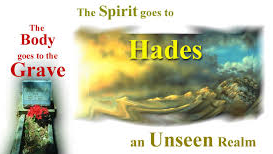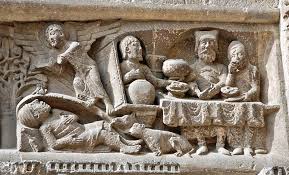
Hades, the Unseen Realm
The word translated “hades”, is the Greek word hah’-dace. The meaning is.. “to not see”, or in other words, “unseen”. It means “the unseen realm”. Hades is the unseen realm where spirits live after being separated from the body at death. Our spirits are still living beings, they are souls, even after they leave our bodies. We’re told in Ecclesiastes 12:7, “Then the dust (the body) will return to the earth as it was, and the spirit will return to God who gave it.”
King David wrote in Psalm 31:5, “Into thy hand I commit my spirit..” And Jesus repeated those words as He died on the cross, “Father, into Thy hands I commit My Spirit. And having said this, He breathed His last.” Luke 23:46
Then we read in Acts 2:27, “Thou will not forsake My soul to hades, nor allow thy Holy One to see corruption.” (or decay) And that’s a quote from Psalm 16:10.
So we can easily see from these scriptures that when the spirit leaves the body at death, it returns to God, where it enters into an “unseen realm”. For a complete discussion of the relationship of the spirit and the soul, please read the article titled, “WHAT IS MY SOUL”.
And as we see from those verses of scripture, that even the Spirit of Jesus Christ, entered that unseen realm called hades. But the scriptures state clearly that God would not abandon His soul (the living Spirit of Jesus) to that “unseen realm”. And another way to phrase that, would be that God would not abandon the soul of Jesus, to remain in that “condition”, the condition of the unseen.
 We’re told in Romans 6:4, “..Christ was raised from the dead by the glory of the Father..” So Jesus was raised from the dead, and His Spirit was temporarily reunited with His physical body. Remember that Acts 2:27 said, “Thou will not forsake My Soul to hades, NOR allow Thy Holy one to see decay.” So then just as Jesus’ spirit was not allowed to remain in the condition of hades, neither was His body allowed to remain in the tomb, and to see physical decay. God the Father, removed Jesus’ Spirit from hades, and He removed His body from the tomb, and joined them back together. Jesus said to His apostles, “See My hands and My feet, that it is I Myself; touch Me and see, for a spirit (a spirit alone) does not have flesh and bones as you see that I have.” Luke 24:39. That’s why we find these words in Luke 24:1-3, “But on the first day of the week, at the early dawn, they came to the tomb bringing spices which they had prepared. And they found the stone rolled away from the tomb, but when they entered, they did not find the BODY of the Lord Jesus.”
We’re told in Romans 6:4, “..Christ was raised from the dead by the glory of the Father..” So Jesus was raised from the dead, and His Spirit was temporarily reunited with His physical body. Remember that Acts 2:27 said, “Thou will not forsake My Soul to hades, NOR allow Thy Holy one to see decay.” So then just as Jesus’ spirit was not allowed to remain in the condition of hades, neither was His body allowed to remain in the tomb, and to see physical decay. God the Father, removed Jesus’ Spirit from hades, and He removed His body from the tomb, and joined them back together. Jesus said to His apostles, “See My hands and My feet, that it is I Myself; touch Me and see, for a spirit (a spirit alone) does not have flesh and bones as you see that I have.” Luke 24:39. That’s why we find these words in Luke 24:1-3, “But on the first day of the week, at the early dawn, they came to the tomb bringing spices which they had prepared. And they found the stone rolled away from the tomb, but when they entered, they did not find the BODY of the Lord Jesus.”
But the reuniting of Jesus’ Spirit with His physical body was only temporary; It was done for the sole purpose of proving His resurrection. We know for a fact that the reunion with the physical body was only temporary because of this fact stated in 1 Corinthians 15:50, “..Flesh and blood CANNOT inherit the kingdom of God.” So when Jesus entered back into heaven, His physical body could NOT have accompanied His Spirit.
Jesus’ ascension is described in Acts 1:9 “And after He said these things, He was lifted up while they were looking on, and a cloud received Him out of their sight”. When Jesus ascended, both His body and Spirit began the ascent. But we just read how flesh and blood CANNOT inherit the spiritual realm of heaven. Therefore, the only possible conclusion, is that during His ascension, Jesus was given His glorified spiritual body, and His physical body was done away with. Just like it says in 1 Cor 15:53, “For this perishable must put on the imperishable, and this mortal must put on immortality.”
The point of all this in regards to this study, is that the spirit goes to hades, and the spirit is referred to as a “soul” when it’s in hades. And even the soul of Jesus went to hades, but it was NOT forsaken, or abandoned to hades! Acts 2:27.
Let me show you something about the word “abandoned”, sometimes translated “forsaken”. The original Greek word is kind of long word, “egkataleipo”. It’s pronounced eng-kat-al-i’-po. Here’s the meaning.. “to abandon, to desert, or to leave one in straits”. Properly.. “to be left in a condition of lack”. God the Father, was not going to leave Christ’s Spirit, in a condition where it was lacking something.
The logical question would be; What is “lacking”, in the realm of, or in the “condition” of, being in hades? Well, the one thing that we know for sure, that the spirit “lacks” in hades, is some sort of “body”. The spirit of man leaves the physical body at death. The spirit WILL someday receive a spiritual body, but that won’t happen until the resurrection at the last day.
 Listen to 1 Cor 15:35, “But someone will say; How are the dead raised, and with what kind of body do they come?” V-37 says, “..that which you sow, you do not sow the body which is to be..” The comparison is to sowing a seed, and how after the seed has germinated, you see a plant come up. The seed is one kind of body, and the plant is another. The same is true of the burial of the physical body, and the resurrection of the spiritual body. Listen to V-44, “It is sown a natural body, it is raised a spiritual body. If there is a natural body, there is also a spiritual body.” V-46 says, “However the spiritual is not first, but the natural, then the spiritual.”
Listen to 1 Cor 15:35, “But someone will say; How are the dead raised, and with what kind of body do they come?” V-37 says, “..that which you sow, you do not sow the body which is to be..” The comparison is to sowing a seed, and how after the seed has germinated, you see a plant come up. The seed is one kind of body, and the plant is another. The same is true of the burial of the physical body, and the resurrection of the spiritual body. Listen to V-44, “It is sown a natural body, it is raised a spiritual body. If there is a natural body, there is also a spiritual body.” V-46 says, “However the spiritual is not first, but the natural, then the spiritual.”
The Body and Spirit
Everyone human being, is made up of body and spirit. (Genesis 2:7) And when the body dies, (death is a separation of body and spirit) the spirit returns to God, where it remains in the unseen realm, (or condition) without a body. But the Spirit of Jesus was very special. The Spirit of Jesus, was the Spirit of God!
John 1:1 says; “In the beginning was the word, and the word was with God, and the word was God!” Verse 14 says; “And the Word became flesh..” And when the Word (Jesus Christ) left His physical body at death, His soul was not abandoned to hades; In other words, His Spirit was not allowed to remain in hades, lacking a body of any kind. And neither was His physical body allowed to see decay as everyone else’s body does.
But rather, Jesus’ body and Spirit were BOTH raised, so that His resurrection could be proved to all! And then, since the physical body cannot inherit the spiritual realm of heaven, His body was obviously “changed” as He ascended to heaven. 1 Cor 15:51-52 tells us, “Behold I tell you a mystery; We shall not all sleep (in other words not everyone will die before the Lord comes again), but we shall all be changed! In a moment, in the twinkling of an eye, at the last trumpet; For the trumpet will sound, and the dead will be raised imperishable, and we shall be changed.”
Hades is an unseen realm, where spirits live, without any kind of a body, from death until the resurrection. We’re told in Hebrews 9:27, “It is appointed for man once to die, and then the judgment.” We die once, and we’re judged once. Of course the judgment won’t occur until the end of time, when everyone will be resurrected and judged.
 2 Corinthians 5:10 tells us, “For we must all appear before the judgment seat of Christ, so that each one may be recompensed for the deeds done in the body, according to what he has done, whether good or bad.” This verse makes it abundantly clear that our “recompense”, in other words our reward or punishment, whatever the case may be, will come at the judgment, not before, and not after. And Jesus reaffirms that fact in Revelation 22:12, when He says, “Behold I am coming quickly (that means He’s coming suddenly), and My reward is with Me, to render to every man according to what he has done.” Listen again.. “My reward is with Me”. In other words, the reward will come when Jesus comes, He’ll have it WITH Him! The word “reward” there means “recompense”. It indicates both good and bad rewards.
2 Corinthians 5:10 tells us, “For we must all appear before the judgment seat of Christ, so that each one may be recompensed for the deeds done in the body, according to what he has done, whether good or bad.” This verse makes it abundantly clear that our “recompense”, in other words our reward or punishment, whatever the case may be, will come at the judgment, not before, and not after. And Jesus reaffirms that fact in Revelation 22:12, when He says, “Behold I am coming quickly (that means He’s coming suddenly), and My reward is with Me, to render to every man according to what he has done.” Listen again.. “My reward is with Me”. In other words, the reward will come when Jesus comes, He’ll have it WITH Him! The word “reward” there means “recompense”. It indicates both good and bad rewards.
These two verses of scripture are both assuring us that our rewards, either good or bad, will come at the final coming of Jesus. Jesus said, “Behold I am coming quickly”. It says in 2 Peter 3:10, “But the day of the Lord will come as a thief!” You don’t know WHEN a thief is coming do you? A thief comes “suddenly”. And the bible says, “We must all appear before the judgment seat of Christ, so that each one may be recompensed for the deeds done in the body..” We will all be paid our “wages” for the things that we do while we live in our physical bodies. Romans 6:23 tells us, “The wages of sin is death..” That’s when a soul dies, by being separated eternally from God. And “payday” will be at the judgment! There’ll be no advance on our pay, and there’ll be no postponing our pay either. The bible clearly says that it will be at the judgment!
And here’s yet another scripture that makes it clear as a bell.. “For the Son of Man is going to come in the glory of His Father with His angels; and will THEN recompense every man according to his deeds.” Mathew 16:27
So, is hades a time or a place of recompense? No, it’s a time and a place of waiting. Is hades a place of advance payment? No, it’s a time of waiting, until we’re allowed to put on our spiritual body; THEN we will receive our full recompense. According to the bible (and that’s the only source that we want to listen to anyway) Hades is an unseen realm, where “unclothed” spirits await the resurrection and the judgment, at the last day.
 Listen to the words of the apostles Paul, in 2 Corinthians 5:1-4, “For we know that if the earthly tent which is our house, (he’s talking about our physical body) is torn down, we have a building from God, a house not made with hands, eternal in the heavens, For indeed, in this house we groan, longing to be clothed with our dwelling from heaven; Inasmuch as we, having put it on, shall not be found naked. For indeed, while we are in this tent, we groan, being burdened, because we do not want to be unclothed, but to BE clothed, in order that what is mortal, may be swallowed up by life.”
Listen to the words of the apostles Paul, in 2 Corinthians 5:1-4, “For we know that if the earthly tent which is our house, (he’s talking about our physical body) is torn down, we have a building from God, a house not made with hands, eternal in the heavens, For indeed, in this house we groan, longing to be clothed with our dwelling from heaven; Inasmuch as we, having put it on, shall not be found naked. For indeed, while we are in this tent, we groan, being burdened, because we do not want to be unclothed, but to BE clothed, in order that what is mortal, may be swallowed up by life.”
God assures us in 1 Cor 15:49, “And just as we have borne the image of the earthly, we shall also bear the image of the heavenly.” Just as we have been “clothed” in a physical body, we shall also be “clothed” in a spiritual body, but not until the resurrection.
Hades is sometimes used figuratively
Hades is obviously a rather “humble” condition, where our spirits remain “unclothed”. Well, the word hades is used figuratively by God, in that very respect; To symbolize being humbled. Listen to what Jesus said in Mathew 11:23, “And you Capernaum, (Capernaum was a flourishing city in the district of Galilee).. You Capernaum, who are exalted to heaven, you will be brought down to hades. For if the miracles had taken place in Sodom, which have taken place in you, it would have remained to this day. Nevertheless, I say to you that it shall be more tolerable for the land of Sodom, in the day of judgment, than for you.”
Capernaum was a flourishing city, and well respected in it’s day. And of course Capernaum refers to the “people” of the city. They were (figuratively speaking) “exalted to heaven”. But Jesus says, “you will be brought down to hades”. Their exalted status would be greatly “humbled” wouldn’t it? To be “brought down” obviously means “to be humbled”. It actually refers to them being judged. “It shall be more tolerable for the land of Sodom, in the day of judgment, than for you!”
So then, the word hades, which refers to a very humble and “unseen” condition, is used figuratively to represent Capernaum being humbled from it’s previously exalted position, where it’s inhabitants would be “unseen”, and unrecognized by God. Remember.. that’s the very meaning of the word hades; “unseen”. Instead of being lifted high for all to see, the people of Capernaum would be humbled, and brought down low, and unseen, and unrecognized as far as salvation is concerned. This same analogy is repeated in Luke 10:15, in what we call a “parallel verse”.
You’ve no doubt heard the bible phrase.. “He who exalts himself will be humbled, and he who humbles himself will be exalted.” That phrase is found four times in the bible.. In Mathew 18:4, and 23:12, and in Luke 14:11, and 18:14. And the principle is stated and illustrated in the bible numerous other times as well; Such as James 4:10, “Humble yourself in the presence of God, and He will exalt you.”
 I believe that the word hades is again used figuratively, or you could say symbolically, in the story of the rich man and Lazarus, from Luke 16:19-31. And the same idea of the proud being humbled, and the humble being exalted, is clearly depicted in this story.
I believe that the word hades is again used figuratively, or you could say symbolically, in the story of the rich man and Lazarus, from Luke 16:19-31. And the same idea of the proud being humbled, and the humble being exalted, is clearly depicted in this story.
Admittedly, most people disagree with the belief that hades is used symbolically in this story. Most people view it as a literal story, about two real people, and real conditions in hades. Most people believe that the story of the rich man and Lazarus refers to two different conditions that exist in hades. One condition is that of being comforted and rewarded, you might say, for being among the saved; and the other condition is that of being punished (for NOT being among the saved), in a virtually identical manner as souls will be punished in Hell.
But of course that interpretation of the story requires that you believe, that people WILL receive at least a portion of their reward or punishment, long before the judgment. But that would be in DIRECT contradiction to those three verses that we looked at, saying that we will be recompensed AT the judgment, and not before. Those verses again are 2 Cor 5:10, Rev 22:12, and Mat 16:27. So while I think most people do have the opinion that the rich man and Lazarus is a literal story about reward and punishment in hades, I have yet to hear anyone even make an attempt, to account for that glaring contradiction, of reward and punishment coming before the judgment.
In our next study, I’d like to show you how the very same symbolism for the word hades, that we saw in those verses about Capernaum, is also used in the story of the rich man and Lazarus. The symbolism that I refer to of course, is that of the word hades, being used to symbolize “being brought down”, and “being humbled”, exactly like Capernaum was brought down and humbled.
The story of the rich man and Lazarus is found in Luke 16:19-31. To go directly to that next study, please click here.
Thanks for being here thus far, and may God bless you in the study of His word.
Please leave any comments or questions, in the space provided below.

Hades…hmmm. I covered this word in my last theology course. I think it is very important for people to understand the biblical vocabulary. When one reads the bible, one tends to see a word totally different than what it truly means. Most vocabulary is based on greek and Hebrew meaning; blessings~
Hi Linda. Interesting comment. But I’m not sure what you mean. Are you suggesting that the word hades, in the new testament means blessings? The word actually comes from a Greek word meaning “not see”, therefore, the meaning is the unseen. Please reply and tell me what you’re saying here. Thanks for your comment.
So it seems that Hades is the same as Purgatory, sort of an interim between the mortal world and the promised land. Is it a punishment to be left in Hades or is that just part of the process for all interim souls?
During this time are our souls fully conscious being or is consciousness suspended until judgement?
Hi Rhett, thanks for your comments and questions. Actually, the idea of purgatory is not found in the bible. Purgatory is a man-made word, and a man-made concept. The idea of purgatory is that souls will be given a chance after death, to still be saved. But that is an anti-scriptural concept. The bible says nothing about a second chance to have sins forgiven after death. Hebrews 9:27 tells us, “It is appointed to man once to die, and after this, the judgment.” The spirits of those who have been separated from their physical bodies at death, are kept by God in hades, in whichever condition that they left their bodies, whether saved or unsaved (lost). Hades is an interim period between physical death and the judgment. It’s not a punishment at all. It is simply that interim period, as you say, between death and judgment. It is a period of rest.
In answer to your second question; No, there is no consciousness in hades, only what the bible calls “sleep”. 1 Thessalonians 4:14 tells us, “For if we believe that Jesus died and rose again, even so, God will bring with Him, those who have fallen asleep in Jesus.” Jesus is going to bring with Him the spirits of those who are asleep in Jesus. He’s not going to bring with him dead bodies, because we know that “flesh and blood cannot inherit the kingdom of heaven”, 1 Cor 15:50. Beside that, a body can never be “in Jesus”, only a spirit can be “in Jesus”. Those who are asleep “in Jesus” are the spirits who have been separated from their physical bodies in death. So then spirits are in a condition that the bible calls “sleep” while in hades, awaiting the judgment, and being kept by God, in the same condition that they died in, whether that be a saved or an unsaved condition.
Thanks so much for your input. May God bless you.
I am so pleased with this…
Hi Dennis. Thanks for your supportive comment. Do you enjoy bible study? I assume that you do. What is one of the subjects that most interests you?